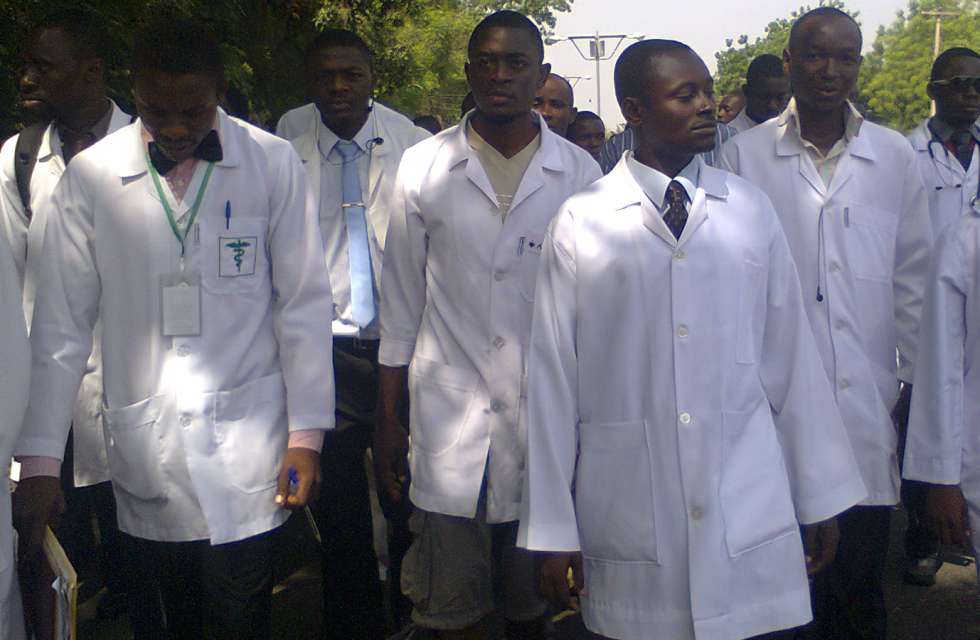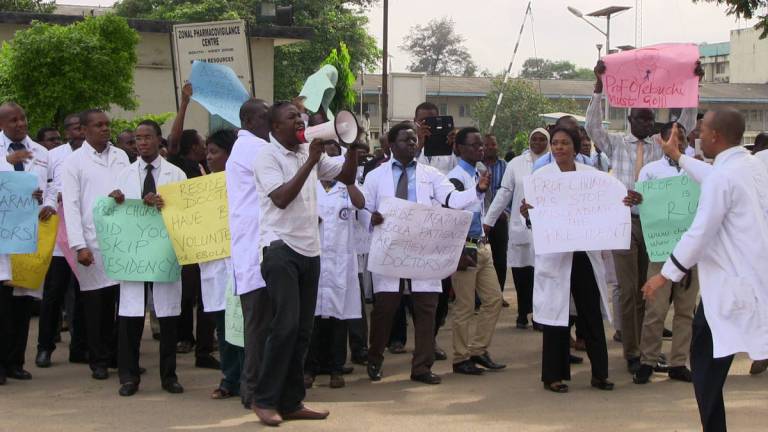In Ogun, It’s One Doctor To 6,400 Patients – NMA Chair
The Nigerian Medical Association has expressed concern over the shortage of doctors in Ogun with the current ratio of one doctor to 6,400 patients in the state.
The NMA Chairman in the state, Dr. Azim Ashimi, revealed that in the last four years, about 25 percent of doctors practising in the state had “left the state for other states in the country and other countries outside of Nigeria, while some have retired from active service.
Ashimi said that the state with over six million people has only 1,000 doctors in the public and private hospitals across the state.
The World Health Organisation recommends a 1:600 doctor-to-patient ratio for member countries, to achieve the Sustainable Development Goals target in healthcare.
Based on the NMA’s list of active doctors in the state, the association insisted that the ratio in Ogun State was approximately ten times worse than the WHO-recommended ratio.
Available statistics show that almost all the government health institutions are battling health worker shortages as they cannot cope with the high number of patients that throng the government hospitals.
Approximately there are 1,197 Nigerian-trained doctors that have moved to the United Kingdom since May 29, 2023, to date.
According to the register of the General Medical Council of the UK, Nigeria is set to overtake Pakistan and become the country with the second-highest number of foreign-trained doctors in the UK.
Currently, India remains the country with the highest number of foreign-trained doctors in the UK.
Though about 1,197 Nigerian-trained doctors were licensed between May 29, 2023, and December 1, 2023, the total number of Nigerian doctors licensed to practice in the UK is now 12,198.
The state chairman, Ashimi, said many of the doctors have left the state for other states in Nigeria, other countries outside of Nigeria, or have retired from active practice.
While listing communicable diseases like malaria and water and food-borne diseases as the most common health conditions in the state, the physician lamented that public hospitals were running sub-optimally and had to reduce the number of patients’ intake so as not to overstretch the available facilities and healthcare workers.
According to him, many of these facilities are making use of any available doctors to cover where there are shortages of specialists or specialties.
The NMA chair said, “Roughly there are presently about 1,000 (one thousand) doctors left in Ogun State. These include doctors in public and private hospitals. Federal Medical Centre Abeokuta remains the single largest employer of doctors and other healthcare practitioners.
“The current ratio will be roughly 1:6,400. This is approximately 10 times worse than the WHO-recommended ration
“From practical experience, the maternal mortality rate has worsened as would be shown by data that will be released by relevant bodies in the New Year. “
The NMA Chairman noted that mortality across all spectrums of ages, genders, and diseases had also increased.
Continuing he said, “A significant number of people arriving at the emergency units of hospitals are arriving very late in the course of their diseases either from lack of funds to access appropriate healthcare, suboptimal or non-availability of primary healthcare close to them, or non-availability of relevant specialists.
“The effect of Japa syndrome is all-encompassing; from inadequate healthcare practitioners to an increase in disease burden due to inadequate care and the proliferation of quacks to fill the gap created by the phenomenon.
“Arguably every agile healthcare practitioner will likely leave. Many are planning to in the coming months while some are not thinking of it immediately.
“However, experience has shown that many who left recently did not plan to do so in the immediate past until something triggered them to do so. It is therefore believed that those who are not immediately planning to japa now will do so when a trigger strong enough is evoked.
“These triggers from experience include embarrassing events like not being able to meet up with children’s school fees, take care of aged parents, own a home and being molested by landlords, and not being able to care for medical bills of loved ones. All of these would paint such a health worker as a failure.
“Other triggers include insecurity (violence against health workers on duty, kidnapping, and so on). Fear is if these continue, Nigeria may lose up to half of its critical health workforce by the end of 2025.”
On how best to stop the mass migration of doctors abroad, the medical expert said the government needs to prioritise the healthcare sector by ensuring adequate and good quality equipment in the hospitals.
He stressed that providing adequate security in the hospital environment and generally improving basic infrastructure would help reduce the number of people who left the country.
He noted, “Government needs to ensure environmental hygiene including adequate waste disposal system, public toilets, potable water supply (pipe borne water), proper monitoring and regulation of food and drink production and so on to reduce the burden of communicable diseases.
“They should ensure universality of health insurance. Universally improve security architecture to curb kidnapping and other vices
“Appropriate remuneration for healthcare workers is close to what they can earn abroad, after all our politicians in Nigeria earn more than their counterparts in some developed countries of the world.





